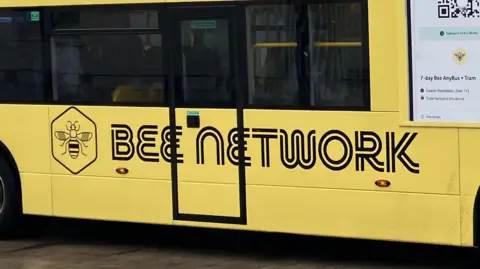Rail stations to come under Bee Network control
 BBC
BBCNearly 100 local railway stations will come under Greater Manchester's Bee Network by 2030, metro mayor Andy Burnham has said.
Mr Burnham is planning to bring the area's rail services under public control with an integrated rail, bus and tram system.
He has promised a simplified fare system, integrated eventually with bus and tram tickets in a "tap-in, tap out" system, and better services.
Vernon Everitt, Greater Manchester Transport Commissioner, called it an "ambitious plan".
He added: "We have demonstrated what can be done with greater local control and accountability for tram, bus and active travel.
"With a more seamless and integrated experience for passengers, more people will choose the train for commuting and leisure, helping reduce the call on public subsidy for rail.
"This plan also needs to be developed in parallel with national reform of rail, with a clearly defined role for mayoral combined authorities in the running of services. We look forward to working closely with the government to finalise those arrangements."
The announcement also outlined the timetable for introducing Bee Network trains, and where they will run, the Local Democracy Reporting Service writes.
Phase one
Its first phase, set for December 2026, will take over lines from Manchester Piccadilly to Hadfield, Glossop, and Rose Hill Marple.
Phase one will also take over the Manchester Victoria to Stalybridge route.
The second phase, scheduled for December 2027, includes the Piccadilly-Airport line, Piccadilly-Cheadle Hulme route, and Piccadilly-Middlewood track.
The final phase, earmarked for March to December 2028, is the largest. It will see TfGM take over city centre stations, as well as routes from town to Appleby Bridge, Wigan North Western, Hindley, and Rochdale.
New maps released with the announcement also show Bee Network trains will serve a new £32m station in Golborne, after the government approved its outline business case.
The phasing of the plan sees 64 stations join the Bee Network by 2028, with a further 32 coming in two years later, taking the total to 96.
Listen to the best of BBC Radio Manchester on Sounds and follow BBC Manchester on Facebook, X, and Instagram and watch BBC North West Tonight on BBC iPlayer.
